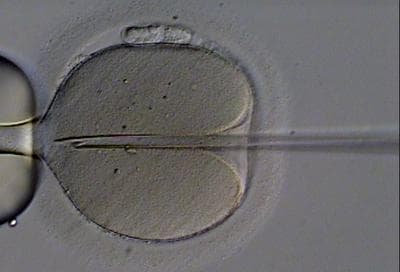Advertisement
Widespread Chemical Bisphenol A Linked To Flawed Eggs In Women

More bad news about Bisphenol A, the all-but-ubiquitous chemical used in plastic bottles and other products:
Researchers at Brigham and Women's Hospital report today that Bisphenol A may contribute to female infertility, based on their findings that in the lab, unfertilized human eggs exposed to high concentrations of BPA are significantly more likely to mature abnormally. From the press release:
“To our knowledge, this is the first study that has shown that BPA has a direct effect on egg maturation in humans,” said [lead researcher Dr. Catherine] Racowsky. “Because exposure to BPA is so ubiquitous, patients and medical professionals should be aware that BPA may cause a significant disruption to the fundamentals of the human reproductive process and may play a role in unexplained infertility.”
The randomized trial examined 352 eggs from 121 consenting patients at a fertility clinic. The eggs, which would have otherwise been discarded, were exposed to varying levels (20 ng/ml, 200 ng/ml and 20 µg/ml) of BPA in a laboratory setting. An egg from each patient was not exposed to BPA and served as the control. Researchers then examined the eggs and found that exposure to BPA caused:
· A decrease in the percentage of eggs that matured.
· An increase in the percentage of eggs that degenerated.
· An increase in the percentage of eggs that underwent spontaneous activation, the abnormal process when an egg acts as though it has been fertilized, even though it has not been.Additionally, the eggs that were exposed to greater levels of BPA had a decreased likelihood of maturity, an increased likelihood of degeneration and an increased likelihood of spontaneous activation. Researchers note that these results are similar to the previous research examining the impact of BPA exposure on animal eggs.
Earlier research suggested that BPA may also be bad for male fertility: A 2010 paper in the journal Nature found that it could damage the DNA in sperm.
But not to panic. First, in an interview, Dr. Racowsky emphasized that this is very early research whose central message is that more research is needed — it is by no means ready for the clinic. Eventually, she said, it may help shed light on infertility in couples who have no other obvious reason for it.
"The message here from a scientific perspective is that this is the first time anyone, to my knowledge, had observed a direct effect of BPA on the quality of eggs, and a lot more work needs to be done," she said. "It may not be BPA acting on its own; it's most likely working either additively or synergistically with a lot of different chemicals, and that needs to be investigated."
Concerns about the possible ill effects of Bisphenol A have been mounting in recent years, to the point that makers of baby and drinking bottles now advertise that they're BPA-free.
Health authorities from the World Health Organization to the U.S. Food and Drug Administration have tended to remain on the fence about BPA and other hormone-mimicking "endocrine disruptors," but pressure from medical groups to warn of their potential harms has been mounting.
A bit on the nuts and bolts: The study used immature eggs discarded by patients in fertility clinics, who consented to their use in research. In women of childbearing age, one egg generally matures each month, in preparation for possible fertilization. That maturation is critical for health of the egg, Dr. Racowsky said.
If you imagine an egg as a football, she said, "think of the seams on the football as being what we would refer to as the fibers, and the two ends of the football as being what we would refer to as the poles. Spindle fibers emanate from the poles down toward the middle of the football, and the chromosomes on the eggs position themselves and move around, up and down, on these spindles.
The shape of the spindle and the alignment of the chromosome is critically important for the correct separation of the chromosomes. If the chromosomes do not separate correctly, then the egg will end up with either too many or too few chromosomes — in which case, generally speaking, if the egg fertilizes it will give rise to an embryo that isn't capable of developing, or if it develops it will give rise to a chromosomally abnormal individual."
"What we found when we exposed eggs to BPA was an increase in the incidence of eggs that had abnormal formation of the spindles, and we also observed a decreased likelihood that the chromosomes would correctly align on the spindle."
